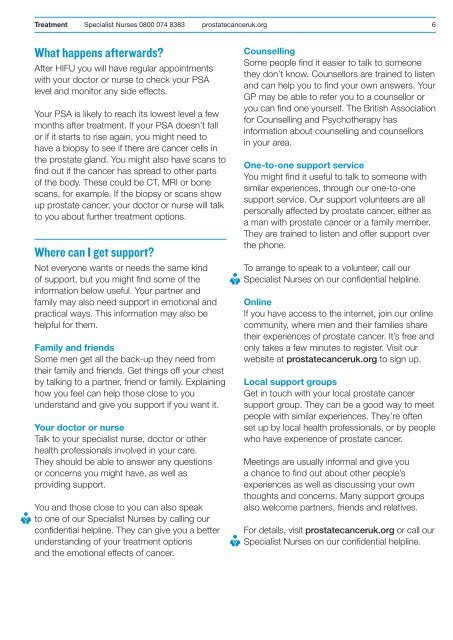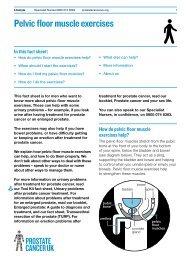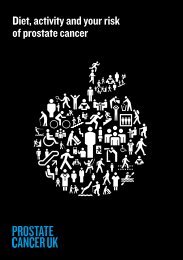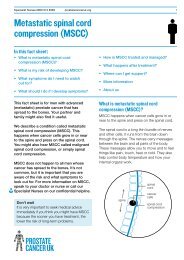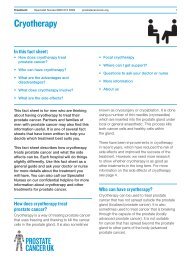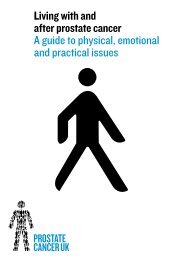High intensity focused ultrasound (HIFU) - Prostate Cancer Charity
High intensity focused ultrasound (HIFU) - Prostate Cancer Charity
High intensity focused ultrasound (HIFU) - Prostate Cancer Charity
- No tags were found...
You also want an ePaper? Increase the reach of your titles
YUMPU automatically turns print PDFs into web optimized ePapers that Google loves.
Treatment Specialist Nurses 0800 074 8383 prostatecanceruk.org6What happens afterwards?After <strong>HIFU</strong> you will have regular appointmentswith your doctor or nurse to check your PSAlevel and monitor any side effects.Your PSA is likely to reach its lowest level a fewmonths after treatment. If your PSA doesn’t fallor if it starts to rise again, you might need tohave a biopsy to see if there are cancer cells inthe prostate gland. You might also have scans tofind out if the cancer has spread to other partsof the body. These could be CT, MRI or bonescans, for example. If the biopsy or scans showup prostate cancer, your doctor or nurse will talkto you about further treatment options.Where can I get support?Not everyone wants or needs the same kindof support, but you might find some of theinformation below useful. Your partner andfamily may also need support in emotional andpractical ways. This information may also behelpful for them.Family and friendsSome men get all the back-up they need fromtheir family and friends. Get things off your chestby talking to a partner, friend or family. Explaininghow you feel can help those close to youunderstand and give you support if you want it.Your doctor or nurseTalk to your specialist nurse, doctor or otherhealth professionals involved in your care.They should be able to answer any questionsor concerns you might have, as well asproviding support.You and those close to you can also speakto one of our Specialist Nurses by calling ourconfidential helpline. They can give you a betterunderstanding of your treatment optionsand the emotional effects of cancer.CounsellingSome people find it easier to talk to someonethey don’t know. Counsellors are trained to listenand can help you to find your own answers. YourGP may be able to refer you to a counsellor oryou can find one yourself. The British Associationfor Counselling and Psychotherapy hasinformation about counselling and counsellorsin your area.One-to-one support serviceYou might find it useful to talk to someone withsimilar experiences, through our one-to-onesupport service. Our support volunteers are allpersonally affected by prostate cancer, either asa man with prostate cancer or a family member.They are trained to listen and offer support overthe phone.To arrange to speak to a volunteer, call ourSpecialist Nurses on our confidential helpline.OnlineIf you have access to the internet, join our onlinecommunity, where men and their families sharetheir experiences of prostate cancer. It’s free andonly takes a few minutes to register. Visit ourwebsite at prostatecanceruk.org to sign up.Local support groupsGet in touch with your local prostate cancersupport group. They can be a good way to meetpeople with similar experiences. They’re oftenset up by local health professionals, or by peoplewho have experience of prostate cancer.Meetings are usually informal and give youa chance to find out about other people’sexperiences as well as discussing your ownthoughts and concerns. Many support groupsalso welcome partners, friends and relatives.For details, visit prostatecanceruk.org or call ourSpecialist Nurses on our confidential helpline.


